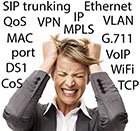Reading articles and blogs about Net Neutrality, one often sees the justification for government interference in the operation of IP networks to allow people stealing copyrighted works using bittorrent (the net neutrality advocates) to consume bandwidth 24/7 at line speed "because the Internet is a public utility."
It ain't. The Internet is a business.
And network service is not and has never been all-you-can-eat-at-access-line-speed flat-rate service. It can't be, as networks are designed based on statistical multiplexing. The capacity internal to the network is less than the total of the access line speeds. If the network was designed for everyone doing all-you-can-eat-at-access-line-speed, the internal capacity would have to be increased by an order of magnitude. Network service would cost 10 times a much.
Network service is a Service Level Agreement, a contract between the user (traffic profile) and the network (transmission characteristics). Watch our video tutorial explaining the idea of a Service Level Agreement on YouTube.
Now, if you want to set up an IP network and operate it as a utility, you are certainly free to do so. But you will very quickly find out that you have to *pay* to connect your IP network to other IP networks so that your subscribers can transmit and receive packets to machines not on your network.
Then you will find out that there are two basic kinds of interconnect services for sale on the free market: peering and transit. Peering is the cheaper option, and doesn't usually include termination guarantees, the network you give your packets to will likely pass them on to one of their peers to get rid of them as quickly as possible. Transit is more expensive, as it usually includes termination and delivery guarantees.
Then you will find out that no-one offers unlimited plans. Only Service Level Agreements based on the RFC2475 Differentiated Services (http://www.faqs.org/rfcs/rfc2475.html) and implemented using MPLS, with transmission characteristics like RFC3246 Expedited Forwarding and RFC2597 Assured Forwarding are for sale.
So you, as the Utility IP network, do some research to determine, based on statistics, what service levels you need to buy for interconnect. You pay for those, then try to break even (if you are a not-for-profit utility) or make some money (if you are a business) charging retail for subscriber access, and providing transit and peering services to other IP networks.
And being altruistic, you make your Utility IP network service unlimited and application-agnostic.
Then 1% of your users run bittorrent 24/7, and it turns out that they use as much interconnect bandwidth as the other 99% of your customers.
So you have to double the interconnect bandwidth, doubling your cost. But you can't raise prices much. You are now in a money-losing situation.
Now, more and more bittorrenters sign up for your service since it is unlimited and application-agnostic. What do you do?
- Go out of business (many ISPs did that)
- Put usage caps on new subscriptions. (Nasty bad press for doing that, but a solution)
OK, now what about all the existing subscribers who have grandfathered unlimited plans? And all of the existing peering and transit contracts you signed on the sell side that have unlimited plans? Including universities?
You analyze the network traffic, and discover that the problem is 1% of your users are generating 50% of the traffic, using one or two applications. And these applications are being used for stealing copyrighted works without paying the authors. Your legal department warns you that on top of the network congestion, there is a risk that the copyright holders will sue you, the network provider, for allowing people to steal their stuff.
What do you do?
- Lose money until you go out of business
- Can't put usage caps on grandfathered subscriptions.
- Ignore the legal risk
- Implement traffic engineering techniques in the network to police the 1% of users so that their overage is only transmitted when there is spare capacity, to ensure that
a) the 99% of users get what they are paying for and
b) you don't have to increase your network infrastructure and its costs by an order of magnitude to scale the network to meet the demand of the 1%ers.
- or maybe plead with the bittorrenters to be good network citizens and kindly stop running that application, as your network was not designed to handle the traffic it generates
- other suggestions?
Please visit our blog to comment on anything in this newsletter, or ask questions. The technical topics in this article are covered in:
TERACOM VIDEOTUTORIAL V9: QoS and Traffic Conditioning:
/samples/video/TERACOM-VIDEOTUTORIAL_V9-qos-and-traffic-conditioning.mp4
https://www.youtube.com/watch?v=jgOePoqpOY0
Course 101 Broadband, Telecom, Datacom and Networking for Non‑Engineers
Telecom 101 Textbook


